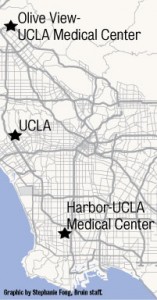The stabbings of two UCLA hospital nurses Sunday have drawn renewed attention to a push by labor groups and state lawmakers for strengthened workplace violence prevention standards in California’s hospitals.
The legislative efforts center on Senate Bill 1299, a measure introduced by Senator Alex Padilla (D-Pacoima) in February. The bill would mandate that the Occupational Safety and Health Standards Board, a state agency tasked with setting workplace safety standards, ensure that hospitals produce detailed workplace violence prevention plans with a focus on education and reporting.
The Olive View-UCLA Medical Center, where one of Sunday’s attacks occurred, is in Padilla’s district.
The bill will be presented to the California State Senate Labor and Industrial Relations Committee on Thursday for its first hearing.
The first stabbing occurred in the early morning on Sunday at the Olive View-UCLA Medical Center in Sylmar. Ramiro Carnalla, a 26-year-old Los Angeles resident, entered the hospital and bypassed the weapons screening area, fleeing security and law enforcement officers.
While searching for Carnalla, officials heard a woman scream and ran toward the noise, finding a nurse with several stab wounds to her torso and a knife at the scene. Carnalla was taken into custody at the hospital.
The nurse’s health is improving, yet she remains in serious but stable condition, said Azar Kattan, a spokeswoman for the Olive View-UCLA Medical Center.
The second stabbing occurred about seven hours later, at 9:20 a.m. in the Harbor-UCLA Medical Center in Torrance. Santee resident Thomas Robert Fredette, 38, entered the hospital and passed through weapons screening, officials said.
Having gained access to the building, Fredette allegedly grabbed a nurse from behind and stabbed her in the ear with a sharp object officials said they believe was a pencil found at the scene. He was arrested on suspicion of assault with a deadly weapon.
Los Angeles County Sheriff’s Department Deputy Kim Manatt said that there is no indication the two cases are related.
Security at the medical facilities is operated by members of the Los Angeles Sheriff’s Department, as well as contracted security guards. In both medical centers, manned security posts sit at the hospitals’ entrances, equipped with x-ray machines and walk-through metal detectors.
Kattan said Olive View-UCLA Medical Center, Harbor-UCLA Medical Center and the Los Angeles County-USC Medical Center all have manned weapons screening stations at their entrances. The generally high level of security was put in place in the wake of a 1993 shooting at the L.A. County-USC Medical Center, which left three doctors wounded.
The current Senate bill seeks to prepare hospital staff to identify and report potentially violent situations, enhancing existing physical security measures.
Among the new standards proposed in the bill are requirements for hospitals to provide annual training for patient care staff on workplace violence and reporting, education on resources for dealing with violence-related stress and internal systems to respond to and investigate violent incidents.
Hospitals would also be asked to keep records of any violent incidents aimed at employees for five years, regardless of whether they result in injury.
In a telephone interview Monday, Stephanie Roberson, a lobbyist for the California Nurses Association, said SB 1299 would tackle workplace safety standards at hospitals with a new, far-reaching approach.
Current laws on hospital workers’ safety focus primarily on hospital emergency rooms, Roberson said, which are the most common sites of violent incidents. The bill would seek to raise safety standards for the entire workplace, she said.
In focusing on planning and training, SB 1299 would tackle workplace violence with a “prescriptive” approach, Roberson said.
The California Nurses Association, which represents about 12,000 nurses at the University of California, condemned the stabbings in a statement Monday and reiterated their support for Padilla’s bill.
“We can not stand by while nurses, other hospital staff, patients, families and visitors are put in harms way in hospitals that fail to provide the measures that will protect their staff and the community,” the union’s Co-President Malinda Markowitz said in a statement. “It is time for the legislature to act.”
Padilla echoed the union’s concerns in a statement published by his office Monday.
“Anyone who has worked in a hospital setting recognizes that you never know who is going to walk through the door, and in what state of mind. We must do a better job of protecting healthcare workers from violence, and make California’s hospitals as safe as possible.”
Sunday’s attacks, carried out by two men who entered the hospital from the street and were not patients, are anomalies in terms of hospital violence, said Steve Kaufer, president of Inter/Action Associates, a security consulting firm specializing in workplace safety.
“Overall, I think (California) hospitals do a pretty good job assessing, training and providing good security programs, but there are always anomalies,” Kaufer said.
Kaufer added that intruder violence is typically not a major driver of violence in hospitals, and that access control and other internal security mechanisms are the most important procedures for hospitals to focus on in preventing violence.
“If someone is really intent on breaching the security perimeter and causing harm, they’re going to do it,” Kattan said. Even so, hospital officials have been meeting this week with the L.A. Sheriff’s Department to review current protocols and discuss the feeling of safety among hospital staff, Kattan said.